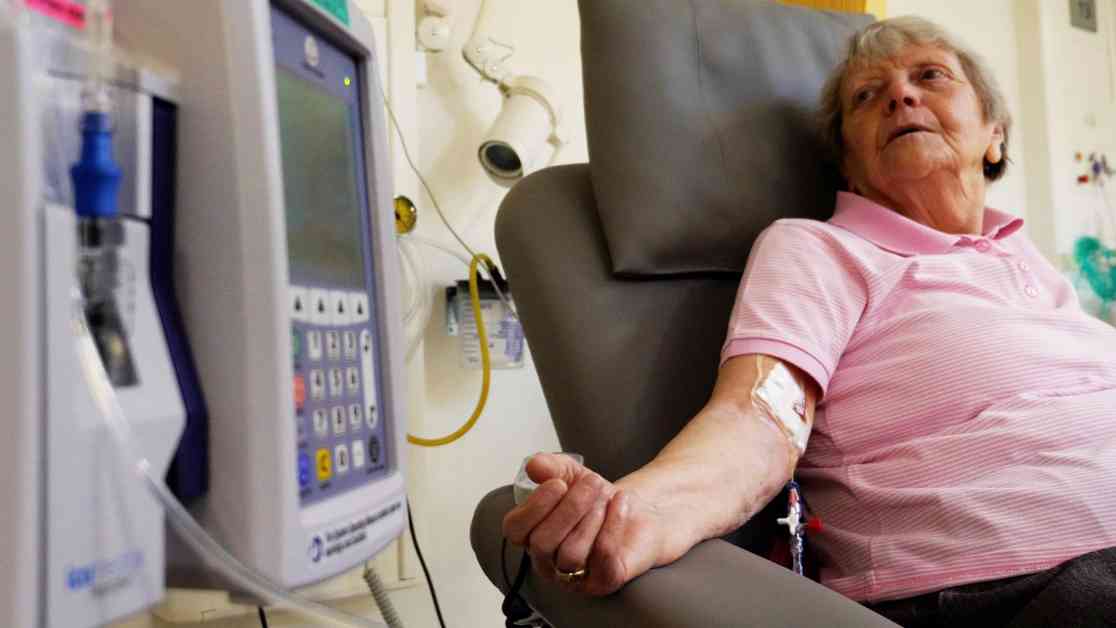Personalized cancer treatment, tailored to individual patients through a revolutionary blood test, is being celebrated as a groundbreaking advancement in the field of oncology. The Target National trial, currently taking place at The Christie hospital in Manchester, aims to revolutionize cancer care by analyzing a patient’s DNA to identify the most effective therapy for their specific condition. According to Dr. Matthew Krebs, the chief investigator of the study, this innovative approach, known as “precision medicine,” has the potential to transform the way cancer is treated, offering hope to a wider range of patients.
Dr. Krebs explains that by isolating circulating DNA fragments shed by cancer cells in the bloodstream, the medical team can extract and analyze this genetic material to pinpoint the specific mutations driving the disease. This personalized approach allows doctors to recommend tailored treatments that target the underlying genetic factors of the cancer, rather than relying on traditional chemotherapy drugs that may not be as effective for every patient. While genetic testing for cancer is not a new concept, the traditional method of collecting samples through invasive biopsies can be painful, delayed, and potentially risky for some patients.
The Target National trial, funded by The Christie Charity and the Sir Bobby Robson Foundation, aims to enroll 6,000 patients to evaluate the effectiveness of this “liquid biopsy” approach in improving patient outcomes. Dr. Krebs acknowledges that this method may not be suitable for everyone, but in certain cases, it has already led to remarkable results. One such success story is that of Pamela Garner-Jones, a 78-year-old woman diagnosed with stage four cervical cancer that was no longer responding to conventional treatments. Facing the prospect of palliative care, Ms. Garner-Jones was offered a spot in the Target National study, where her blood test results matched her to a cutting-edge immunotherapy drug trial.
Ms. Garner-Jones recalls her disbelief when she was informed that her cancer was inoperable and that traditional treatments were no longer effective. However, the opportunity to participate in the trial proved to be life-changing for her. Through the new drug trial identified by the blood test, her tumor shrank significantly, rekindling her energy and appetite. She expresses her gratitude for the simplicity of the blood test procedure compared to the intensive drug regimens she had previously endured. With renewed vigor and optimism, Ms. Garner-Jones looks forward to enjoying quality time with her loved ones and pursuing activities that bring her joy.
The impact of the Target National trial extends beyond individual success stories like that of Ms. Garner-Jones. Dr. Krebs emphasizes that the goal of the study is to expand access to personalized cancer care for a broader population of patients, ultimately aiming to integrate this approach into routine healthcare services offered by the NHS. The potential of this blood test to guide treatment decisions based on a patient’s unique genetic profile represents a significant step forward in the fight against cancer, offering hope and optimism to those facing this challenging disease.
As research continues and more patients benefit from this innovative approach, the future of cancer care is poised to become increasingly personalized and effective. The transformative power of precision medicine, as demonstrated by the Target National trial, underscores the importance of harnessing cutting-edge technology and scientific advancements to improve patient outcomes and enhance quality of life. With each success story, like that of Pamela Garner-Jones, the potential of personalized cancer treatment to save lives and restore hope shines ever brighter. In the words of Ms. Garner-Jones herself, the impact of this revolutionary blood test is truly life-saving, offering a beacon of optimism in the face of adversity.










